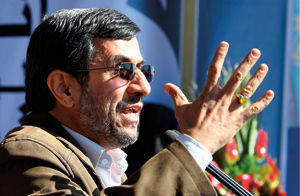CQ WEEKLY – VANTAGE POINT
Feb. 25, 2012 – 1:33 p.m.
Decoding Iran’s Intent
By Jonathan Broder, CQ Staff
Is Iran’s hostility toward Israel so irrational that the country would launch a nuclear attack and risk an Israeli counterstrike that would effectively wipe Iran off the map?

|
||
|
That is the new question in the escalating debate between those in Washington and Jerusalem who want some form of military action against Iran’s nuclear program soon and those who are cautioning restraint.
Israeli Prime Minister Benjamin Netanyahu will make the case for the dangers posed by an irrational, implacable Iran when he visits Washington this week for talks with President Obama. And he is expected to emphasize the same point when he addresses the annual policy conference of the American-Israel Public Affairs Committee, or AIPAC, the influential pro-Israel lobby.
A bipartisan group of senators has prepared the ground on Capitol Hill by introducing a resolution that would rule out containment as a U.S. policy for dealing with a nuclear-capable Iran. So far, 35 senators, equally divided between Democrats and Republicans, have signed on as cosponsors of the measure, which AIPAC is pushing.
“I know that containment might have been viable for the Soviet Union during the Cold War, but it’s not going to work with the current fanatical Islamist regime in Tehran,” said
Obama has imposed harsh sanctions on Iran in an attempt to reopen negotiations over its nuclear program. But although top U.S. military and intelligence officials certainly see Iran as a growing challenge to U.S. interests in the Middle East, they do not regard its leaders, including President Mahmoud Ahmadinejad, as crazy, particularly in the face of overwhelming U.S. firepower and U.S. pledges to defend Israel. “Iran is unlikely to initiate or provoke a conflict,” Gen. Ronald Burgess, director of the Defense Intelligence Agency, recently told the Senate Armed Services Committee. Gen.
That has long been the view of the U.S. intelligence community. A 2007 National Intelligence Estimate, reflecting the consensus view of all 16 intelligence agencies, concluded that Iran’s leaders, despite their bluster, are “guided by a cost-benefit approach” — bureaucratic shorthand for knowing that the price of a war against Israel would be too high for Tehran to bear. Lt. Gen.
The Senate resolution tries to bring U.S. policy closer to Israel’s by declaring that preventing Iran from acquiring nuclear capability rather than waiting for it to get actual nuclear weapons is an American “vital interest.” Obama has warned of possible military action against Tehran if it actually decides to develop such weapons. Israel, though, argues that once Iran has the capability to produce nuclear weapons, it will be too late.
Not everyone in Israel regards Iran as the dire threat that Netanyahu sees. In December, the respected Ha’aretz newspaper reported that Tamir Pardo, the chief of Israel’s Mossad intelligence agency, concluded that a nuclear-armed Iran was not an existential threat to Israel. Two former Mossad chiefs, Efraim Halevy and Meir Dagan, have said the same thing publicly, arguing that Iran’s leaders might try to use its nuclear might to exert pressure on Israel but they would not dare to use it, knowing that Israeli retaliation would devastate Iran and drive them from power. The CIA estimates that Israel has at least 200 nuclear warheads.
Such estimates don't appear to have changed the minds of pro-Israel lawmakers in Washington. Arizona's John McCain, the top Republican on the Senate Armed Services Committee and another cosponsor of the resolution, said during a visit to Jerusalem last week that Iran's defiance of sanctions, isolation and the threat of conflict was proof of the regime's fanaticism. "It is hard to see this as rational behavior," he said. "Any regime with an abiding concern for its own security, self-interest and self-preservation would not engage in such deeply provocative conduct."